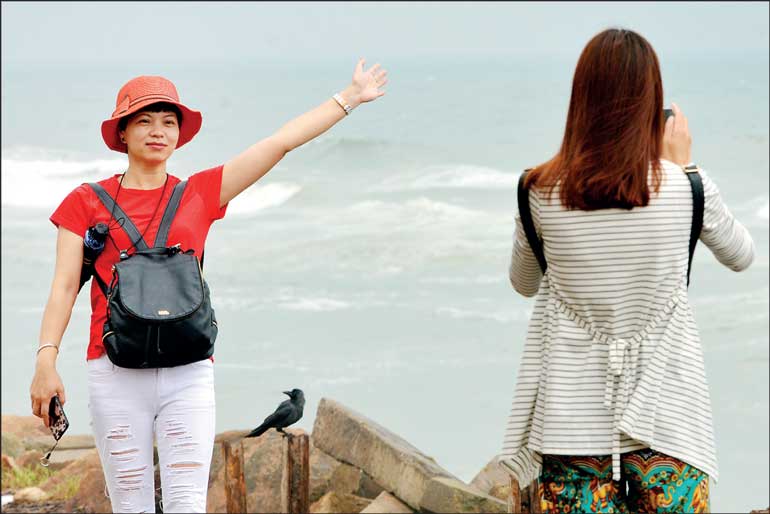Saturday Feb 14, 2026
Saturday Feb 14, 2026
Saturday, 17 September 2022 00:10 - - {{hitsCtrl.values.hits}}

Sri Lanka is such a captivating destination; it deserves many times the visitors we have achieved in the past
– Pic by Shehan Gunasekara
 We keep hearing proclamations of Sri Lanka needing to bank on tourism (a case I’ve made frequently). And we are presented in the press with a canopy of tourism leaders assuring us that we’ll be represented in the trade fairs and that they will ensure the “product” is in great shape.
We keep hearing proclamations of Sri Lanka needing to bank on tourism (a case I’ve made frequently). And we are presented in the press with a canopy of tourism leaders assuring us that we’ll be represented in the trade fairs and that they will ensure the “product” is in great shape.
However, just being “present” isn’t enough. And the “product” needs work, and liberalised tourist visas will flounder when people cannot avail of products they expect as part of their leisure experience. “Going local” for a week is one thing, for several months at a time, not a coherent proposition.
And even for a week, depends on whether we wish to get the “top end” as well as the more adventurous, exploratory and culturally inquisitive tourist base.
We often hear from experienced hoteliers, “No one has ever complained about lack of overseas produce.” Well, our “peak” was 2 million tourists, while Thailand had 39 million and Malaysia 26 million and Morocco 12 million, and so the “complaint” was lodged by all those higher spenders who didn’t land on our shores or avail of our treasures. They lost out, so did we.
In corporate circles, one of the big mistakes is to define the ‘market’ as those who currently use our product or service, and ignore the ocean of “non-users” who we wish to induct, enrol, engage and inspire.
Typical laments
I received this from one of the top suppliers in the field: “The entire industry is facing a huge dilemma, as the government has imposed import bans on spirits. Not sure how they are going to drive the tourism industry without wines and spirits. Very frustrating times.”
When I forwarded this to a key decision maker, I was told this was a misunderstanding, and it can be authorised via import control, by stating it will be used for tourism.
I suggested that this guidance then needs to make it out to the trade. And I was assured this was “in process.” Said “process” is clearly unknown to this industry leader. Moreover, there is the issue of banks releasing at least some initial foreign exchange to kick the ball into play, even if further tourism earnings in foreign exchange can then take over. This requires a concerted solution, not isolated “antics” of the type we have currently. And the cost of bureaucratic confusion and rework undermines the cutting edge of otherwise admirable aims.
Alas, communication of how to “manage” some of the crazy strictures (these “bans” are having to be reviewed weekly as industry after industry and SMEs galore are up in arms about how it will cripple their viability let alone their competitiveness), is too often, too little, too late.
We allow confusion to circulate, despair to mount, people to pull back investment and planning, as isolated reflexive “moves” are undertaken, with no sense of collateral impact, or context.
Beaches
“Sea and sand” was one of the beckoning features of the Sri Lanka tourism positioning originally. And the quality of accommodations along beaches, and the reopening of the glorious, pristine East Coast beaches, all add to this trove.
Here is a missive I received from a leading resident diplomat:
“I receive many reports of foreign tourists from our country and otherwise who complain about the very bad state of beaches in the West, South and East. Having good transportation, hotels and services is pointless if the beaches – which are one of the main attractions – are always dirty (in the last year, I witnessed it myself). If the situation is not structurally improved, people will not come and there is actually the risk that the number will further decrease due to bad publicity. From my perspective urgently fixing this problem should be the number one priority.”
We may not be overflowing in cash, but surely a national campaign of this type would be patriotically stirring and pragmatically impactful. And then we have something to showcase and highlight at these fairs and for bloggers, and on social media and more. Otherwise, a brief additional flight takes people to Thailand, Maldives, Seychelles, and so many more options, where culture and pristine, beckoning, natural beauty, exquisitely collaborate.
The product
A top hotelier here was recently visiting The Ritz-Carlton Koh Samui. The sheer grace bespeaks the charm of the setting the gorgeous cocoon that has been created. Genuine culinary options, with real character and verve, have you happily linger for days.
And this hotelier in his pricey pool villa, compared the pricey pool villa his own group offers here in Serendib, and said “no comparison”.
And it’s not primarily the physical product. It’s the interplay with the service, the standards, the meticulous hygiene, those “Gold Standards” we are seeking to introduce to the Lanka service landscape. And Koh Samui is not the pinnacle of Southeast Asian luxury. It excels, but is not in benchmarking terms, exceptional.
And so we have to raise our standards. This was the insight that Aman, when they were fully Adrian Zecha’s love child, plumbed. Find the best place there “should be” a hotel and isn’t, and create it, and make it an oasis, create your own service ecosystem.
Intimacy of this type can yield dividends far greater than “splash,” so Lanka can play the game in many ways, as long as we “choose” our positioning and then commit to the relevant demonstration of excellence accordingly.
Credibility
We are berated in Geneva on the Human Rights front and for “Economic crimes.” And we may rightly complain about double standards, but the world has had to rally to try and respond to Sri Lanka’s “implosion.” And so the world has some standing to want assurances that such economic mishaps will not be repeated and it is the Sri Lankan people and not a tottering political apparatus that are the real beneficiaries of the assistance being lavished.
So it is our ability to convert commitments into decisive action and into sustained results that has to be cultivated and then reliably demonstrated. Only thus are we credible at home or abroad.
Sri Lanka is such a captivating destination; it deserves many times the visitors we have achieved in the past. And the flow of their custom can accelerate our recovery and help establish real prosperity.
And so Sri Lanka needs to develop experiences for niche travelers, and hone its aesthetic capabilities, and its natural hospitality and create real service standards and culinary “hot spots”, so the magical allure, the remarkable diversity, can all be more expansively experienced and at key “perception points,” enhanced.
Then indeed we can entice people away from arctic winters and invite them into our sun kissed embrace. Especially those who can invest in Sri Lanka’s blossoming.
And where there are “quick wins” like clear communication and import strategies that allow tourism the tools it needs, or cleaning beaches, or to have toilets cleaned hourly on luxury trains where we install cost-effective solar panels providing “air conditioning”, or upgrading the “visit” website for travelers entering the country, at least these types of things, let us do with fervour and zeal and alacrity.
And then, bolstering national credibility, we can take an impassioned and innovative swing at the next horizon.
(The writer is the founder and CEO of EPL Global and founder of Sensei Lanka, a global consultant with over 30 years strategic leadership experience and now, since March 2020, a globally recognised COVID researcher and commentator.)